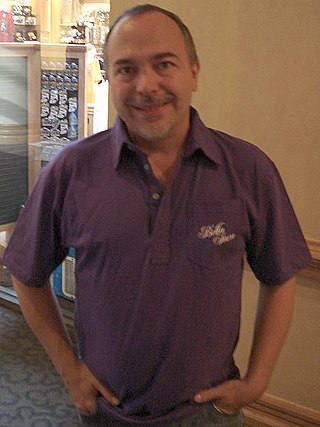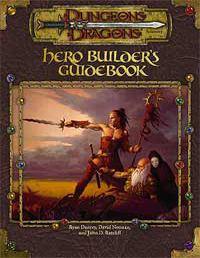Related Research Articles

Dungeons & Dragons is a fantasy tabletop role-playing game (RPG) originally created and designed by Gary Gygax and Dave Arneson. The game was first published in 1974 by Tactical Studies Rules, Inc. (TSR). It has been published by Wizards of the Coast, now a subsidiary of Hasbro, since 1997. The game was derived from miniature wargames, with a variation of the 1971 game Chainmail serving as the initial rule system. D&D's publication is commonly recognized as the beginning of modern role-playing games and the role-playing game industry, and also deeply influenced video games, especially the role-playing video game genre.

Dragon is one of the two official magazines for source material for the Dungeons & Dragons role-playing game and associated products, along with Dungeon.

Wizards of the Coast LLC is an American publisher of games, primarily based on fantasy and science fiction themes, and formerly an operator of retail stores for games. It is currently a subsidiary of Hasbro, which acquired the company in 1999. During a February 2021 reorganization at Hasbro, Wizards of the Coast became the lead part of the new "Wizards & Digital" division.
The d20 System is a role-playing game system published in 2000 by Wizards of the Coast, originally developed for the 3rd edition of Dungeons & Dragons. The system is named after the 20-sided dice which are central to the core mechanics of many actions in the game.
Open gaming is a movement within the tabletop role-playing game (RPG) industry with superficial similarities to the open source software movement. The key aspect is that copyright holders license their works under public copyright licenses that permit others to make copies or create derivative works of the game.

Legend of the Five Rings is a fictional setting created by John Zinser, Dave Seay, Ryan Dancey, Dave Williams, DJ Trindle, Matt Wilson and John Wick and first published by a joint venture between Alderac Entertainment Group and ISOMEDIA in 1995. The setting primarily involves the fictional empire of Rokugan, though some additional areas and cultures have been discussed. Rokugan is based roughly on feudal Japan with influences from other East Asian cultures such as China, Mongolia and Korea. This setting is the basis for the Legend of the Five Rings Collectible Card Game as well as the Legend of the Five Rings Roleplaying Game. Legend of the Five Rings was also the "featured campaign setting" of the Oriental Adventures expansion to the third edition of Dungeons & Dragons, though this book is now out of print.
The Open Game License (OGL) is a public copyright license by Wizards of the Coast that may be used by tabletop role-playing game developers to grant permission to modify, copy, and redistribute some of the content designed for their games, notably game mechanics. However, they must share-alike copies and derivative works.
An owlbear is a fictional creature originally created for the Dungeons & Dragons fantasy role-playing game. An owlbear is depicted as a cross between a bear and an owl, which "hugs" like a bear and attacks with its beak. Inspired by a plastic toy made in Hong Kong, Gary Gygax created the owlbear and introduced the creature to the game in the 1975 Greyhawk supplement; the creature has since appeared in every subsequent edition of the game. Owlbears, or similar beasts, also appear in several other fantasy role-playing games, video games and other media.
In the open gaming movement, a System Reference Document (SRD) is a reference for a role-playing game's mechanics licensed under the Open Game License (OGL) to allow other publishers to make material compatible with that game.
The Five Rings Publishing Group (FRPG) was formed as a spin-out of Alderac Entertainment Group and ISOMEDIA.
Several different editions of the Dungeons & Dragons (D&D) fantasy role-playing game have been produced since 1974. The current publisher of D&D, Wizards of the Coast, produces new materials only for the most current edition of the game. However, many D&D fans continue to play older versions of the game and some third-party companies continue to publish materials compatible with these older editions.

Peter D. Adkison is an American game designer and businessman who is the founder and first CEO of Wizards of the Coast (1993–2001).

Bill Slavicsek is an American game designer and writer who served as the Director of Roleplaying Design and Development at Wizards of the Coast. He previously worked for West End Games and TSR, Inc., and designed products for Dungeons & Dragons, Star Wars, Alternity, Torg, Paranoia and Ghostbusters.
Paizo Inc. is an American role-playing game publishing company based in Redmond, Washington, best known for the tabletop role-playing games Pathfinder and Starfinder. The company's name is derived from the Greek word παίζωpaizō, which means 'I play' or 'to play'. Paizo also runs an online retail store selling role-playing games board games, comic books, toys, clothing, accessories and other products, as well as an Internet forum community.
The Game System License is a license that allows third-party publishers to create products compatible with and using the intellectual property from the 4th edition of Dungeons & Dragons (D&D). It was released to the public by Wizards of the Coast (WotC) on June 17, 2008.

The Pathfinder Roleplaying Game is a fantasy role-playing game (RPG) that was published in 2009 by Paizo Publishing. The first edition extends and modifies the System Reference Document (SRD) based on the revised 3rd edition Dungeons & Dragons (D&D) published by Wizards of the Coast under the Open Game License (OGL) and is intended to be backward-compatible with that edition.

Hero Builder's Guidebook is an accessory for the 3rd edition of the Dungeons & Dragons fantasy role-playing game.
Scott Rouse was the D&D Brand Manager at Wizards of the Coast, and part of the production staff for the fourth edition of Dungeons & Dragons.
Linae Foster was the D&D Licensing Manager at Wizards of the Coast, and part of the production staff for the fourth edition of Dungeons & Dragons.

Kobold Press, also known as Open Design, is an American game company that produces role-playing games and game supplements.
References
- 1 2 Martinez, Michael J. (July 7, 2000). "Dungeons & Dragons Tries To Revive". AP Online. Archived from the original on September 24, 2015. Retrieved May 30, 2015– via HighBeam Research.
- 1 2 3 4 5 6 7 8 9 Appelcline, Shannon (2011). Designers & Dragons. Mongoose Publishing. ISBN 978-1-907702-58-7.
- ↑ Noah, Eric (2002-02-28). "The Most Dangerous Column in Gaming". Interview with Ryan Dancey. Wizards of the Coast. Archived from the original (Interview) on April 4, 2002. Retrieved 2008-02-26.
- ↑ "Pyramid: Pyramid Review: Hero Builder's Guidebook (for Dungeons & Dragons)". Sjgames.com. Retrieved 4 January 2018.
- ↑ Gaming Industry Innovators CCP and White Wolf to Merge, CCP, November 11, 2006, archived from the original on January 1, 2010, retrieved November 19, 2009
- ↑ "A Journey of a Thousand Miles Begins with a Single Step - Goblinworks". Goblinworks.com. Retrieved 4 January 2018.
- ↑ "Lisa's Community Address - Goblinworks". Goblinworks.com. Archived from the original on 5 January 2018. Retrieved 4 January 2018.
- ↑ "Updated Text of Lisa Stevens' Community Address about the state of Pathfinder..." Plus.google.com. Retrieved 4 January 2018.